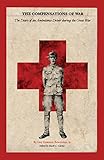The Compensations of War : The Diary of an Ambulance Driver during the Great War / Guy Emerson Bowerman; ed. by Mark C. Carnes.
Material type: TextPublisher: Austin : University of Texas Press, [2012]Copyright date: 1983Description: 1 online resource (200 p.)Content type:
TextPublisher: Austin : University of Texas Press, [2012]Copyright date: 1983Description: 1 online resource (200 p.)Content type: - 9780292749177
- 940.4/7573
- online - DeGruyter
| Item type | Current library | Call number | URL | Status | Notes | Barcode | |
|---|---|---|---|---|---|---|---|
 eBook
eBook
|
Biblioteca "Angelicum" Pont. Univ. S.Tommaso d'Aquino Nuvola online | online - DeGruyter (Browse shelf(Opens below)) | Online access | Not for loan (Accesso limitato) | Accesso per gli utenti autorizzati / Access for authorized users | (dgr)9780292749177 |
Frontmatter -- Contents -- Introduction -- Diary -- Maps -- Appendix 1. Complete Roster of s.s.u. 585 from August 7,1917, to April 23, 1919 -- Appendix 2. Station List, Section 585 -- Glossary
restricted access online access with authorization star
http://purl.org/coar/access_right/c_16ec
In 1917, shortly after the United States’ declaration of war on Germany, Guy Emerson Bowerman, Jr., enlisted in the American army’s ambulance service. Like other young ambulance drivers—Hemingway, Dos Passos, Cummings, Cowley—Bowerman longed to “see the show.” He was glad to learn that the ambulance units were leaving for France right away. For seventeen months, until the armistice of November 1918, Bowerman kept an almost daily diary of the war. To read his words today is to live the war with an immediacy and vividness of detail that is astonishing. Only twenty when he enlisted, Bowerman was an idealistic, if snobbish, young man who exulted that his section was made up mostly of young “Yalies” like himself. But he expected the war to change him, and it did. In the end he writes that he and his compatriots scarcely remember a world at peace. "The old life was gone forever. . ." Guy Bowerman’s unit was attached to a French infantry division stationed near Verdun. Sent to halt the German drive to Paris in 1918, the division participated in the decisive counterattack of July and tracked the routed Germans through Belgium. Then, “unwarned,” Bowerman and his comrades were “plunged into … a life of peace.” Into this life, he writes, they walked “bewildered,” like “men fearing ambush.” This remarkable chronicle of one young man’s rite of passage is destined to become a classic in the literature of the Great War.
Mode of access: Internet via World Wide Web.
In English.
Description based on online resource; title from PDF title page (publisher's Web site, viewed 26. Aug 2024)


